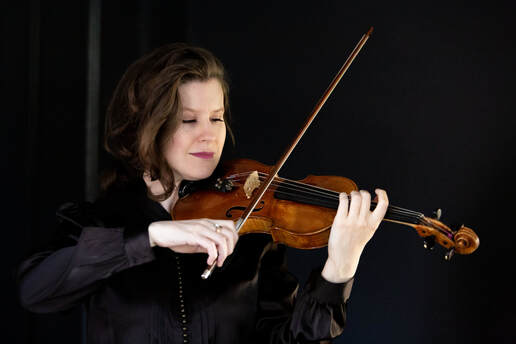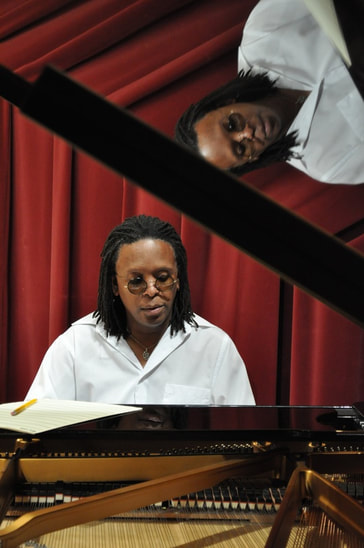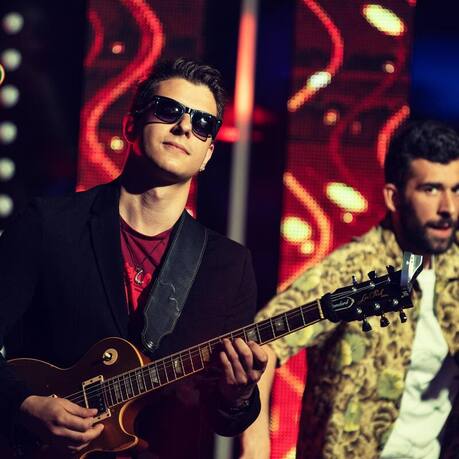ABOUT Our Teachers
Ariadna Kryazheva - violin, voice, Alexander technique teacher

Ariadna Kryazheva is a performer immersed in both classical and jazz music. Her first steps as a musician started at the age of 5 at the Glazunov School of Music in St.-Petersburg, Russia. Violin became her first instrument, piano joined as a secondary when she was 7.
Throughout her own violin education process, Ariadna encountered some physical and psychological challenges, which lead to her becoming deeply passionate about music education based on mind-body wellness. Ariadna combines the approach from the Russian violin school with Alexander Technique, to ensure the proper instrumental technique and connection to one's ability to produce an individual tone on the violin.
Ariadna graduated from the Lamont School of Music at the University of Denver as a classical violinist and a jazz vocalist with a double Bachelor of Music degree. After years of classical and jazz training she is now a composer, arranger, lyricist, and a free improviser, still playing trumpet and piano in addition to violin and singing.
Ariadna is an AmSAT certified Alexander Technique teacher. She completed the 1600-hour training over the course of three years at the Riverside Initiative For The Alexander Technique directed by Nanette Walsh.
In addition, Ariadna completed the three levels of Somatic Voicework™ training with Jeanette LoVetri and applies the principles of the work in her teaching.
Ariadna teaches violin, voice, and Alexander Technique at Mindful Music Studio.
www.aryadnamusic.com
www.embodytheinstrument.com
Throughout her own violin education process, Ariadna encountered some physical and psychological challenges, which lead to her becoming deeply passionate about music education based on mind-body wellness. Ariadna combines the approach from the Russian violin school with Alexander Technique, to ensure the proper instrumental technique and connection to one's ability to produce an individual tone on the violin.
Ariadna graduated from the Lamont School of Music at the University of Denver as a classical violinist and a jazz vocalist with a double Bachelor of Music degree. After years of classical and jazz training she is now a composer, arranger, lyricist, and a free improviser, still playing trumpet and piano in addition to violin and singing.
Ariadna is an AmSAT certified Alexander Technique teacher. She completed the 1600-hour training over the course of three years at the Riverside Initiative For The Alexander Technique directed by Nanette Walsh.
In addition, Ariadna completed the three levels of Somatic Voicework™ training with Jeanette LoVetri and applies the principles of the work in her teaching.
Ariadna teaches violin, voice, and Alexander Technique at Mindful Music Studio.
www.aryadnamusic.com
www.embodytheinstrument.com
David Harewood - piano, jazz improvisation, music theory teacher

David Harewood was born and raised in New York City. He attended the famous Manhattan high school of Music and Art, where upon he began playing the piano in his senior year at the age of 19. After a year at Northwestern University, he spent the summer at the Berklee School of Music followed by the Mannes College of Music and then Queens College to see if playing catch-up in the competitive world of music was possible given his late start to the piano. After spending 10 years as a church musician and playing with various jazz and pop artists during that period, the answer to that question was a resounding yes!
David graduated from the Lamont School of Music at the University of Denver on a full scholarship and was awarded a degree in Jazz Studies. He also immersed himself in studying the classical repertoire. He studied classical piano with Alice Rybak, jazz piano with Eric Gunnison, and composition with Bill Hill.
Upon graduation, David traveled to Villard de Lans, France and performed at the jazz festival there with vocalist Heidi Schmidt. David also performed in Sopot, Poland with Ralph Alessi, Mark Helias, Tyshawn Sorey and Ravi Coltrane.
David received his Graduate Degree in Piano Performance and Composition at the Longy School of Music at Bard College.
David has taught piano to all ages since 1999 and is a sought after teacher.
David teaches piano, voice, music theory, composition, and improvisation at Mindful Music Studio.
www.davidharewoodmusic.com
David graduated from the Lamont School of Music at the University of Denver on a full scholarship and was awarded a degree in Jazz Studies. He also immersed himself in studying the classical repertoire. He studied classical piano with Alice Rybak, jazz piano with Eric Gunnison, and composition with Bill Hill.
Upon graduation, David traveled to Villard de Lans, France and performed at the jazz festival there with vocalist Heidi Schmidt. David also performed in Sopot, Poland with Ralph Alessi, Mark Helias, Tyshawn Sorey and Ravi Coltrane.
David received his Graduate Degree in Piano Performance and Composition at the Longy School of Music at Bard College.
David has taught piano to all ages since 1999 and is a sought after teacher.
David teaches piano, voice, music theory, composition, and improvisation at Mindful Music Studio.
www.davidharewoodmusic.com
Together David and Ariadna started a music program at the Easton Art Center in Easton, CT, and were on the faculty at the Long Ridge Music Center in Stamford, CT from 2015-2018.
DRAGAN "GAGI" HAJNTIH - Guitar teacher

Gagi Heinrich (Dragan Hajnrih, born 10.11.1993) is an eclectic and versatile guitarist and composer, born and raised in Belgrade (Serbia). After Gagi Heinrich (Dragan Hajnrih) is an eclectic and versatile guitarist and composer, born and raised in Belgrade (Serbia). After winning scholarships for renowned music
schools in the US, Gagi is now based in Boston where he's pursuing Jazz Composition Master Studies at Longy School of Music. He was also a scholarship holder at Berklee College of Music where he spent 2 year being mentored by legendary guitarists: David Fiuczynski, Tim Miller and David Gilmour. After winning scholarships for renowned music schools in the US, Gagi is now based in Boston where he's pursuing Jazz Composition Graduate Studies at Longy School of Music. He was also a scholarship holder at Berklee College of Music where he spent 2 year being mentored by legendary guitarists: David Fiuczynski, Tim Miller and David Gilmour. Gagi Heinrich's world fusion music will take the audience
through a mysterious journey through a human’s mind. From absolute uncertainty to a state of epic
confidence, Gagi's music showcase a compositional approach that is open-minded, full of nuance and
intrigue. These effective and uncomplicated raw melodies are destined to be imprinted into the listeners’
memory, convincing them to dig deep and travel to a state of being determined, sophistically confident,
and inspired as he is.
Gagi is a teacher who encourages students to achieve more, whether it’s the technique or concepts,
overcoming roadblocks in performance, or striving to arrange and compose. Catering to all levels, from
complete beginners to other performing musicians.
Aimed to teach through technical exercises that equip students with the capabilities needed to read, write
and perform music regardless of genre. Approach to all techniques will be thought through music with a
short set list of songs each student desire to play. Whether it is classical, jazz, rock, Latin, Balkan,
fingerstyle, or any other genre, students will learn progressively.
schools in the US, Gagi is now based in Boston where he's pursuing Jazz Composition Master Studies at Longy School of Music. He was also a scholarship holder at Berklee College of Music where he spent 2 year being mentored by legendary guitarists: David Fiuczynski, Tim Miller and David Gilmour. After winning scholarships for renowned music schools in the US, Gagi is now based in Boston where he's pursuing Jazz Composition Graduate Studies at Longy School of Music. He was also a scholarship holder at Berklee College of Music where he spent 2 year being mentored by legendary guitarists: David Fiuczynski, Tim Miller and David Gilmour. Gagi Heinrich's world fusion music will take the audience
through a mysterious journey through a human’s mind. From absolute uncertainty to a state of epic
confidence, Gagi's music showcase a compositional approach that is open-minded, full of nuance and
intrigue. These effective and uncomplicated raw melodies are destined to be imprinted into the listeners’
memory, convincing them to dig deep and travel to a state of being determined, sophistically confident,
and inspired as he is.
Gagi is a teacher who encourages students to achieve more, whether it’s the technique or concepts,
overcoming roadblocks in performance, or striving to arrange and compose. Catering to all levels, from
complete beginners to other performing musicians.
Aimed to teach through technical exercises that equip students with the capabilities needed to read, write
and perform music regardless of genre. Approach to all techniques will be thought through music with a
short set list of songs each student desire to play. Whether it is classical, jazz, rock, Latin, Balkan,
fingerstyle, or any other genre, students will learn progressively.
Our Philosophy
Music is a fun and rewarding endeavor. However, playing an instrument is complex and requires commitment and proper instruction. In the United States it is common practice to involve children in multiple extracurricular activities at once to see which strikes their interest and awakens their talents. They sign up for once a week music lessons somewhere between karate, pottery, and dance, and often time these lessons are merely half an hour long. Unlike those other activities music lessons require daily practice at home as well as the understanding of the basics of music theory. The student is learning a whole new language along with the physical aspects of playing an instrument (technique).
Mindfulness is a core component of our work. Teaching mind-body awareness and being present in the moment is crucial in the fast-paced modern world. It can be overwhelming to try and internalize music theory and instrumental technique in one short lesson. We create a comprehensive course to aid in reading notation, ear training, and self-expression, applying the principles of Alexander Technique and Somatic Voicework™ in our teaching.
Playing an instrument is all about connecting the dots between the senses. We train the brain to link the visual information (notation on the page) with kinesthetic information on the instrument (pressing down a key or a string), hear the sound it produces and mimic the pitch with your voice. Most people think that singing has nothing to do with playing piano or violin, but it is crucial to be able to sing in tune the notes you are playing. String instruments such as violin, viola, cello, and bass have no keys or frets. You have to know exactly where the notes are by ear. If you can’t sing it, you can’t play it.
Being "tone-deaf" is a myth, unless you have an underlying condition preventing you from hearing sound. Almost anyone can be trained to hear and reproduce pitch.
Mindfulness is a core component of our work. Teaching mind-body awareness and being present in the moment is crucial in the fast-paced modern world. It can be overwhelming to try and internalize music theory and instrumental technique in one short lesson. We create a comprehensive course to aid in reading notation, ear training, and self-expression, applying the principles of Alexander Technique and Somatic Voicework™ in our teaching.
Playing an instrument is all about connecting the dots between the senses. We train the brain to link the visual information (notation on the page) with kinesthetic information on the instrument (pressing down a key or a string), hear the sound it produces and mimic the pitch with your voice. Most people think that singing has nothing to do with playing piano or violin, but it is crucial to be able to sing in tune the notes you are playing. String instruments such as violin, viola, cello, and bass have no keys or frets. You have to know exactly where the notes are by ear. If you can’t sing it, you can’t play it.
Being "tone-deaf" is a myth, unless you have an underlying condition preventing you from hearing sound. Almost anyone can be trained to hear and reproduce pitch.
piano teacher arlington
violin teacher arlington
voice teacher arlington
jazz teacher arlington
drum teacher arlington
guitar teacher arlington
cello teacher arlington
HoursBy Appointment Only
OUR LOCATION
27 Buena Vista Rd, Arlington, MA, 02476
Telephone(781)-316-0290
|
Copyright © 2012-2019 Mindful Music Studio™ of Mindful Music, Inc. All Rights Reserved. Privacy Policy and Terms and Conditions.
